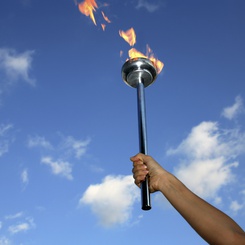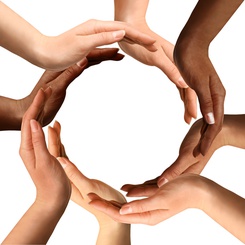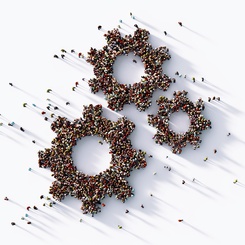With ESSEC Knowledge Editor-in-chief
When you think of the Olympics and the Paralympics, you probably think of the glitz and glamour of the Opening and Closing ceremonies, the stunning physical feats of athletes at the top of their field, planning your calendar to catch your favourite events… in short, the events of the Games themselves, not so much about the planning that leads to them. While we’re probably more aware of the logistics this time around, with the Japan 2021 games occurring while a pandemic still runs rampant, the logistics and planning still take place largely behind the scenes. Stefan Gröschl, professor of management, recently explored what goes into the planning of the Olympics and Paralympics to provide a better understanding of the managerial and organizational challenges and identify key competencies for organizing major sporting events. The lessons learned here can be applied to other work contexts as well, as we prepare for the post-pandemic work milieu.
There are a few factors that make the Olympics and Paralympics so unique: the amount of visitors they attract, the media coverage, the high cost, the impact on the local community, and the time involved. When you add the bid process for potential host cities and the general preparation time, you’re looking at a preparation process of eight to nine years. The situation gets increasingly complex and increasingly uncertain, as seen by last year’s last minute cancellation and the uncertainty still surrounding this year’s events. setting the Games apart from other big sporting events like EURO 2020. This complexity and uncertainty distinguish the Olympics and Paralympics from other large-scale events.
Dr. Gröschl explored what it takes to be up to the challenge of organizing the Games and the managerial takeaways we can learn from the process. He interviewed Ricardo Leyser Gonçalves, one of the key organizers of the Rio de Janeiro Games as head of the Rio Olympic Committee in 2016, inquiring about key competencies, priorities, crisis management, and more.
What it takes to be an Olympian (organizer, that is)
There are a number of important skills that Leyser Gonçalves identified in his interview with Dr. Gröschl. These are:
Operational knowledge: One needs a thorough understanding of what the event entails, its history, and the different players involved, especially of the political relationships and interpersonal conflicts in play. It is important to understand the different motivations and interests of decision-makers to be able to collaborate.
Soft skills: This leads us to the next skill: it’s important to have strong interpersonal skills to be able to mediate between different groups, communicate and collaborate effectively, and be a good team player. Negotiation and persuasion skills are also key to coordinate work with different task forces.
Team coordination: With so many different groups involved, it is critical to coordinate the work of different task forces, even when they are not directly under your control. For example, Leyser Gonçalves identifies airports as a key operational element: he had to make sure they were accessible for wheelchair users, but had no direct control over technical staff who could do this, so had to motivate the different teams with their shared goal of hosting the first Olympic and Paralympic Games in South America.
Goal-setting: It was also important to set goals small and large, short, mid, and long term, and to make sure these goals aligned with the ultimate goal of delivering the Olympics and Paralympics. In addition to setting goals, Leyser Gonçalves was also faced with the challenge of aligning teams to shared goals; no small feat given the shifting goalposts in the form of temporary teams and changing goals. He also notes the necessity of always keeping your goal(s) in mind, even under high uncertainty and complexity.
Resilience: Remember the time frame involved - organizing the Olympics and Paralympics is a long game, taking place over the span of several years. This means that a lot can change: staff, directives, economic situation… This means one must be able to roll with the punches and adapt to a changing environment.
Project management: There are more technical skills involved, such as acquisition, budgeting, and meeting deadlines, which fall under the more general project management umbrella.
Prioritizing tasks: A related skill is being able to prioritize tasks. When asked how he did so, Leyser Gonçalves notes that on a strategic level, the key priorities and timetable are established by the International Olympic Committee and International Paralympic Committee. They set key milestones along the way. On an operational level, he brought up the importance of having clear objectives as to be able to organize priorities and tasks. In his case, objective #1 was to “deliver the Games”. Objective #2 was “this delivery is not at all costs”. Keeping these in mind allowed him to stay focused and get creative with how to accomplish Objective #1 while still respecting Objective #2.
Key challenges of a mega sport event
With so many balls in the air (pun intended), there’s going to be some challenges.
Communication: Leyser Gonçalves explains that a main challenge is establishing a single communication channel to streamline communications so wires don’t get crossed. He also reiterated the importance of establishing strong relationships with the different players, like the IOC, IPC, local governments, etc. This is beneficial for understanding the politics of the different organizations and anticipating and managing conflict.
Sharing knowledge: Since the Olympics and Paralympics are such a massive, historical undertaking, Leyser Gonçalves also explains that one of his biggest challenges was in truly understanding the Games: the different preparation and planning stages, the players involved, the federations, the governmental public sector roles… and making sure that all team members shared this knowledge and built relationships with their counterparts on other teams.
Planning: Another key lesson was the importance of planning right from Day 1, which Leyser Gonçalves notes was a problem his team experienced. Since there is so much to be done, there is no time to waste, and contracts and operational structures need to be established in advance.
Key managerial takeaways
While being an organizer for the Olympics and Paralympics does require some specific skills, there are managerial lessons to be learned for leaders in other areas, too. Leyser Gonçalves highlights the importance of focus, trusting your team, and time management.
Focus on your goal: Identify your key objective (in this case, delivering the Games) and stay focused on that, even when faced with challenges that threaten to derail the objective.
Trust your team and delegate: It is impossible to work by yourself, especially when working on a mega sport event or even a large project. It’s critical to build teams that you empower and trust, and delegate tasks to them. This helps keep your eye on the prize.
Time management: The importance of planning and prioritization comes up again here. Time is a finite resource and can’t be bought once gone, making effective time management an essential skill.
Lessons for COVID 2021
Of course, this year’s Games are occurring under very complicated circumstances. Leyser Gonçalves believes this highlights the need for task forces with diverse expertise that can address different aspects of the crisis. Keeping focus and keeping your objectives in mind are also critical for hosting a mega sporting event during the still-active crisis. Given the sheer amount of players involved, from the usual suspects like the IOC and IPC to the World Health Organization, organizers should prioritize communication and collaboration to remain on the same page, making those soft skills ever more important.
The lessons are equally important for those not involved in the Olympics: the complexity and uncertainty that COVID-19 has generated apply to virtually every business these days. This means that we should all be thinking about the skills that can help get us through the crisis, and how leaders can encourage and develop these in their organizations.
Contributions
When we watch the Olympics and Paralympics this year, we can now do so with an insider’s perspective on all that goes into the Games. The qualitative approach employed by Dr. Gröschl gives us rich, detailed insight, a unique quality in a field dominated by quantitative research.
While most of us are not organizers of the Olympics or even a mega sporting event, the managerial lessons learned here can be applied to many situations and emphasize the need for soft skills in addition to technical skills. Communication, creativity, time management, resilience, teamwork: these are often bandied about as important, and this brings home their utility for leaders, particularly in complex, changing situations. It’s also useful to define your goals from the get-go, and to keep focused on those goals over time.
We can all be Olympians - if only in how we approach our work!
Further reading
Groschl, S. (2021). Planning and organizing the Olympic and Paralympic Games: the case of Rio 2016. Sport, Business and Management: An International Journal.









